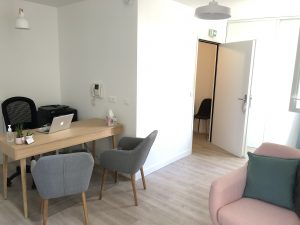I receive children, teenagers and adults in my office with kindness, empathy, respect and a collaborative approach. The first consultations allow me to get to know you and discuss your expectations, feelings and difficulties. We will explore together the different therapeutic possibilities.
I can propose some psychological support during a difficult period and / or transition in your life. I can also accompany you in a desired individual change or in the treatment of various disorders with a therapeutic approach.
 I can particularly help with different issues at different times of life:
I can particularly help with different issues at different times of life:
- Perinatality & parenthood: Pregnancy, adoption, assisted reproduction and infertility, perinatal mourning, pre-/post-natal depression, parenting, parent-child bonding, parental guidance.
- Childhood: sleep / food / behavioral disorders in early childhood without organic cause, separation anxiety.
- Childhood, Adolescence: Social / performance anxiety, self-assertion, social and emotional skills, giftedness, Attention Deficit Disorder with / without Hyperactivity (ADHD), Oppositional Defiant Disorder (ODD), Autism Spectrum Disorder (ASD) .
- Childhood, adolescence, adult: Anxiety disorder (generalized anxiety disorder, panic disorder with or without agoraphobia, phobia), depressive disorder, obsessive-compulsive disorder, addictive disorder (video games, cyber-addiction, eating behavior), giftedness, expatriation / repatriation.
- Adult - Life at work: Assertiveness, well-being, burnout, professional growth, stress management.
I do teleconsultation and I can eventually do home consultations in certain circumstances.
Trained to multiple tests, I can offer different types of assessments in the context of a diagnosis or as part of a therapy. Soon, I will be able to propose some reimbursed assessments in the framework of the early 0-6 years autism plan. I also perform emotional and social remediation sessions for children with autistic disorder, but also for children with ADHD, ODD or social/performance anxiety.
When I receive children, I always involve the parents in charge of the children because parents are experts of their children and important actors of change. Below 3-4 years old, I always receive children with their parents. Beyond, I see the child alone and regularly receive parents. Finally, I receive teenagers alone but I can propose some family interviews with the agreement of the teenager, if it is necessary to the change.